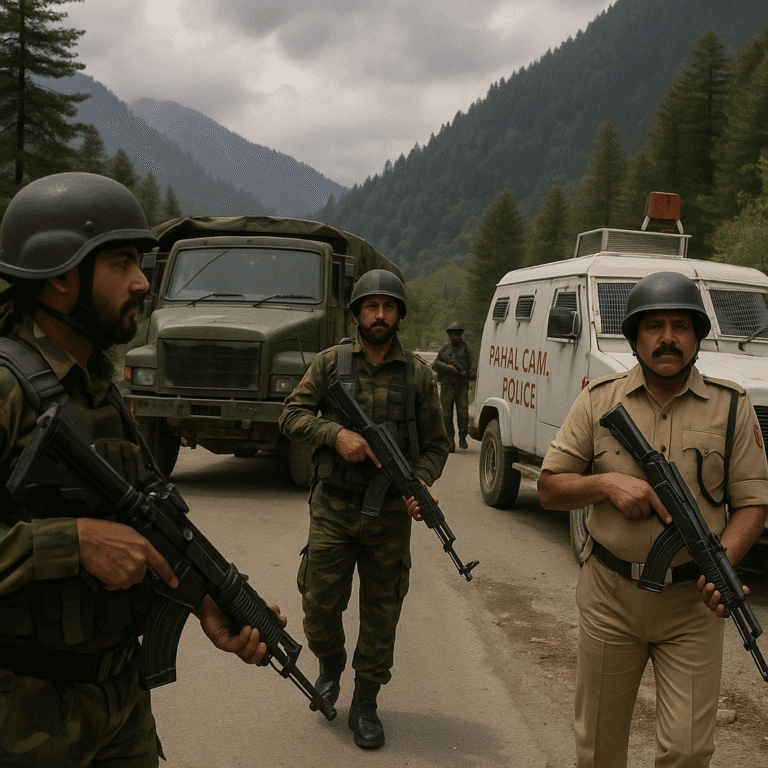Pahalgam Terror Attack:
A Tragic Day in Kashmir’s Tourism Hub

Pahalgam Attack 2025: On April 22, 2025, the calm of Baisaran Valley in Pahalgam was shattered by a brutal terrorist attack that claimed 26 lives and left more than 20 others wounded. What was supposed to be a day of leisure in one of Kashmir’s most scenic destinations became one of the darkest chapters in the region’s recent history.
Among the dead in Phalgam Attack were 25 Indian nationals and one Nepali tourist. Witnesses described scenes of chaos and horror, with gunmen opening fire on unsuspecting visitors enjoying the valley’s green slopes and crisp spring air.
The attack took place during the late morning hours. Tourists had gathered in Baisaran Valley, a spot popular for its pony rides, hiking trails, and panoramic views of the surrounding mountains.
Survivors reported that the attackers approached in civilian clothing, which allowed them to blend in before opening fire. Several reports suggest that the gunmen may have asked the victims questions about their identity before targeting them—though this detail is still under investigation.
The Resistance Front (TRF), a group that Indian intelligence links to Lashkar-e-Taiba, claimed responsibility for the Pahalgam Terror Attack. TRF has been active in recent years, often using online platforms to take credit for attacks and spread propaganda.
A group called The Resistance Front, reportedly linked to the Pakistan-based Lashkar-e-Taiba, claimed responsibility for Pahalgam Attack.
Prime Minister Narendra Modi condemned the Pahalgam attack, calling it an “inhuman act of cowardice.” He assured the public that those responsible would be identified and punished swiftly. Home Minister Amit Shah also expressed his condolences and directed security agencies to intensify counterterrorism operations in the region.
As a direct response, India temporarily closed a key land border crossing with Pakistan and announced a suspension of the Indus Waters Treaty—one of the oldest water-sharing agreements between the two nations. This action signaled a serious diplomatic escalation.
Globally, the response was swift. Statements of condemnation came from several world leaders, including the US Vice President, who was on an official visit to India when the attack occurred. The United Nations issued a statement urging restraint but also called for coordinated efforts to tackle terrorism in the region.
India responded by shutting a land route to Pakistan and temporarily suspending the Indus Waters Treaty. These were seen as immediate signals of diplomatic fallout.
International reactions were swift. The U.S. Vice President, already in India at the time, expressed solidarity and support.
The incident has not only escalated tensions between India and Pakistan but has also sparked unrest within India. In some cities, there were reports of verbal abuse and hostility directed at Kashmiri residents and students. Community leaders have appealed for calm, emphasizing that an act of terrorism should not result in collective blame or violence.
Security in Kashmir has been ramped up significantly since the attack. Additional checkpoints have been established, and surveillance in high-tourist areas has been expanded.
Tourism Takes a Hit of Pahalgam Attack
Kashmir’s economy depends heavily on tourism. April typically marks the start of the spring travel season, with families, pilgrims, and solo travelers arriving in large numbers. The attack has created a wave of cancellations, not only in Pahalgam but in other popular areas like Gulmarg and Sonamarg.
Local businesses—from hotel owners to tour guides and handicraft sellers—are already feeling the economic strain. Many of them had just started recovering from the pandemic-era decline in tourism.
State officials have promised to increase the presence of security personnel in tourist hubs and are working with national agencies to restore a sense of safety. Meanwhile, local stakeholders are encouraging travelers not to abandon Kashmir altogether.
Looking Ahead
In the days following the Pahalgam terror attack, the people of Pahalgam have shown remarkable resilience. Volunteers helped transport victims to nearby hospitals. Residents provided shelter to stranded tourists. Civil society groups have been active in offering mental health support to survivors.
The government has introduced a set of safety guidelines and is encouraging travelers to register their itineraries in advance. Tour operators are being advised to stay in constant touch with local security forces to ensure a quick response if needed.
Authorities are also recommending the use of reputable transportation and lodging services. Platforms like Srinagar Tourist Taxi are being highlighted as trusted options for visitors.
Kashmir remains a region of remarkable beauty, and tourism remains crucial for its economy.
Visitors considering a trip are encouraged to rely on established, verified services like Srinagar Tourist Taxi for a safe journey.

